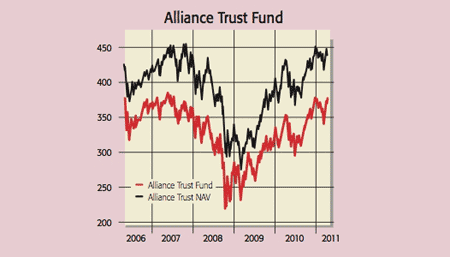
There’s a storm brewing at one of Britain’s oldest investment trusts, the £2.4bn Alliance Trust. Laxey Partners, an activist investment firm, has built up a 1.5% stake and is now demanding substantial changes to the way the trust is managed. This makes sense. Alliance was set up in 1888 and has more than 44,000 shareholders, mainly small investors looking to make a decent dividend income over the long term. But things aren’t working out quite as they should.
The firm has raised the dividend every year for the last 44 years, which is good. But it hasn’t done so well when it comes to growing capital: over the past five years the fund has returned 11.5%, compared to a sector average of 20.7%. The result? The trust now trades on a huge 15% discount to its net asset value (NAV). So you can buy a share for a lot less than the assets it represents. That could be a great deal. But only if the discount closes.
So how might that happen? There are two possibilities. The first, the one that Laxey favours, is the speediest – a discount control mechanism (DCM). Laxey wants Alliance to move into the market and buy back its own shares whenever the discount moves beyond 10%. That would cut supply and move the price up. But Alliance doesn’t like the idea, partly because it sees it as an overly rigid structure and partly because such a system would eventually shrink the size of the fund.
Instead, CEO Katherine Garrett-Cox says she is working on improving the fund’s performance. With this in mind, she is investing with “higher conviction” and using a “more dynamic investment strategy”. This might work, but it isn’t a given and it could take a long time. While the trust’s top holdings contain many of the defensive dividend-payers we like at MoneyWeek, it is also very heavily invested in financials in one form or another (they make up 18% of the investments). It also has rather too many holdings for any to be considered to be real conviction investments.
However, that doesn’t mean long-term holders of the trust should necessarily be selling out. Laxey isn’t the first to pick a fight with Alliance: Troy Asset Management tried and failed to get them to accept a DCM in 2009. But the fact that the attention from Laxey has come so soon and that another activist hedge fund, Elliot International, has just picked up a 3% stake, could mean Alliance is eventually forced to take action. The discount has already closed from 18% to 15% this year. As an investor, I would hang on in for now: after all, given the discount, the downside is fairly limited.